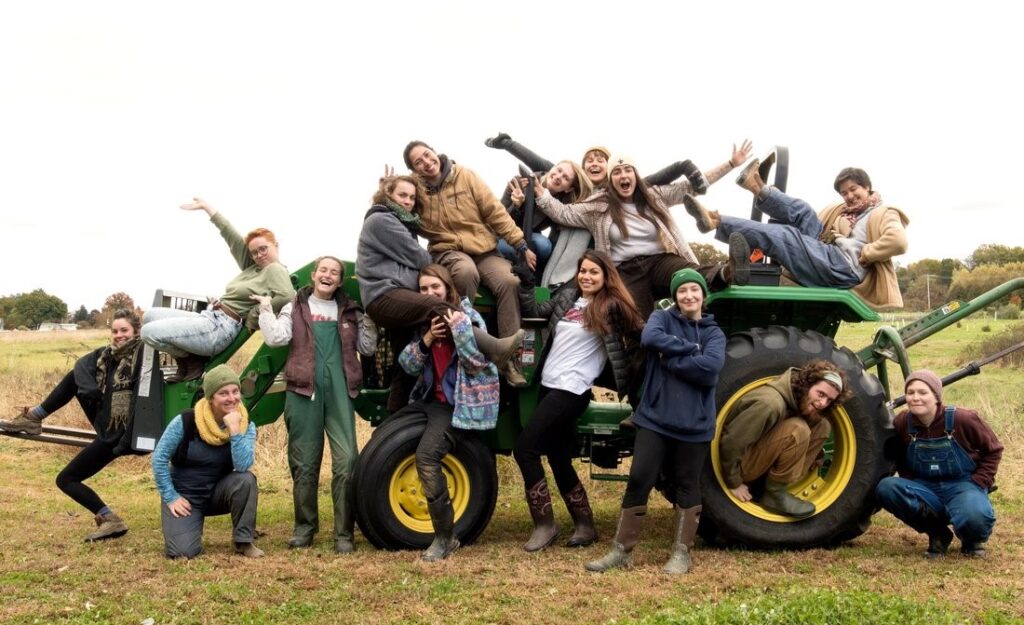The UMass Student Farm is a student-run farm on campus that manages 14 acres of land and grows 35 different crops using ecologically sound practices. They supplied UMass Dining with over 10,000 lbs of local, fresh, organic vegetables in the past year. Produce from the Student Farm is featured in all four Dining Commons, at the weekly Student Farmers’ Market on Goodell Lawn, and at four Big Y locations. The Student Farm also offers Fall CSA (Community Supported Agriculture) shares to the campus community every year, enabling students, faculty, and staff to purchase a share in the farm and pick up over 25 pounds of fresh organic produce every week for ten weeks (September through November).
| The Student Farm is unique because of the power the students have to make decisions about the farm. They do everything from crop planning to marketing, all production tasks in the field, and analysis at the end of the season. They make all of the |
decisions about how to run the farm and spend their time. “We have a lot of trust put in us and carry a lot of responsibility, which may be intimidating, but it feels very refreshing when in most of our classes our biggest responsibility is turning in a paper,” says Kyle Zegel, a Sustainable Food and Farming major from UMass in the 2018 Student Farm Crew.
This decision making power allows students to shape the program to their own learning objectives. For example, the 2018 crew made a lot of efforts on the farm to increase its environmental and social sustainability. This year the crew piloted inter-row cover cropping to reduce the amount of tillage, bare soil, and weeding that they had to do. Additionally, in 2019 the Student Farm provided 25 free CSA shares to campus community members that would not have otherwise been able to afford them using grant money from the Sustainability Initiative and Engagement Fund. In partnership with the Food For All Program, they also worked to donate all of the excess produce, flowers, and fresh herbs from the farm to Not Bread Alone in Amherst and the Amherst Survival Center.
Throughout the season they donated over 5 tons of produce to these community partners. Carly Brand, a BDIC major and a member of the 2018 crew remarked, “I’m proud of the donations we were able to give to Not Bread Alone and the Amherst Survival Center on top of all the markets we have; the volunteers always received our deliveries with such gratitude. I don’t think many people have full clarity on the issue of local food insecurity or the impact that we can have with a small redistribution.” The farmers made small deliveries every week and often biweekly to Not Bread Alone for over six months this season.
| Farming is already an extremely difficult profession to be successful without 100% turnover each year and many first-time farmers running the operation. However, the Student Farm always manages to persevere and come out on top of whatever challenges they face. Kyle Zegel speaks to this, explaining, “This year was a really tough year. We had several intense heat waves, an incredibly wet late summer and fall, and several periods of labor shortage. We were hit hard with diseases … and a lot of plants never made it into the ground, which made us short for our markets. |
Sometimes we work in torrential downpours or near 100 degree heat. People get burnt out, sick and injured. We also have to constantly deal with the stress of crop failure and anxiety about finances, but what keeps me going on the toughest days is knowing that this work that we do is providing fresh, nutritious food to our community.” Carly Brand add, “Even when it was painfully early or too cold to feel our toes, it felt worth it to be part of a strong, supportive community and to interact with our ‘consumers’ directly after. Working on the farm constantly reminds us to recognize the full value of the food we grow, and to do everything we can to prevent it from going to waste.”
Kyle’s advice to readers that care about where your food comes from is to “learn about agriculture and see if you can help farmers make their systems more sustainable. Go volunteer for food waste recovery and food equity organizations in your area and understand the extent of food insecurity in your area. The more involved you get with the growing, processing, and distribution of food, the more you’ll be able to understand about what work needs to be done in our food system.”

2018 Student Farm Crew pictured from left to right: Ainsley McStay, Amanda Brown, Kayleigh Boucher, Jackie Montminy, Jordan Lake, Lee Mcloughlin, Merav Dale, Nicole Mendes, Serena Hooper, Carly Brand, Sierra Torres, Sofia Cincotta, Kyle Zegel, Shannon Mo, and Avi Flynn.
Thanks so much to Carly Brand, Kyle Zegel, and the rest of the Student Farm program at UMass for all of the hard work you do to provide our campus community with affordable organic produce every year! For more information about the Student Farm, visit their website. Sign ups for the 2020 CSA program will begin in March- be sure to catch their Early Bird discount! Consider making a donation to the Student Farm to fund free CSA shares for our campus community in 2019.

